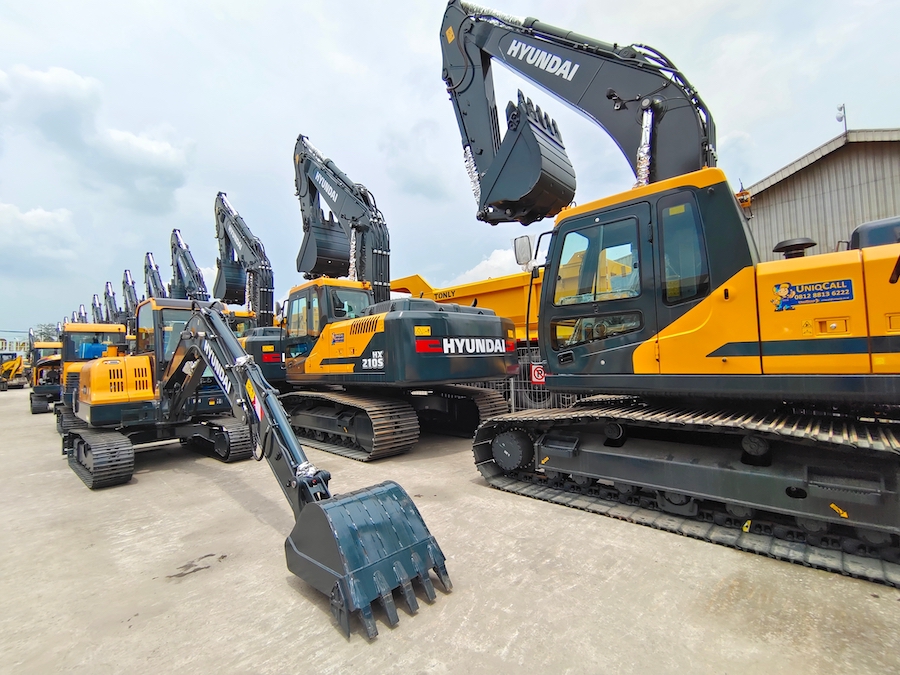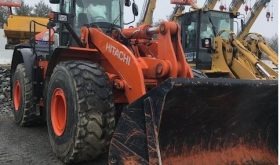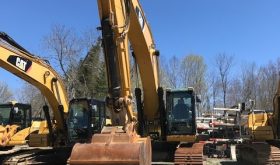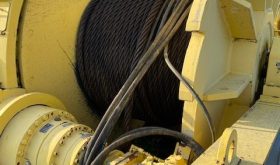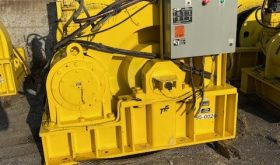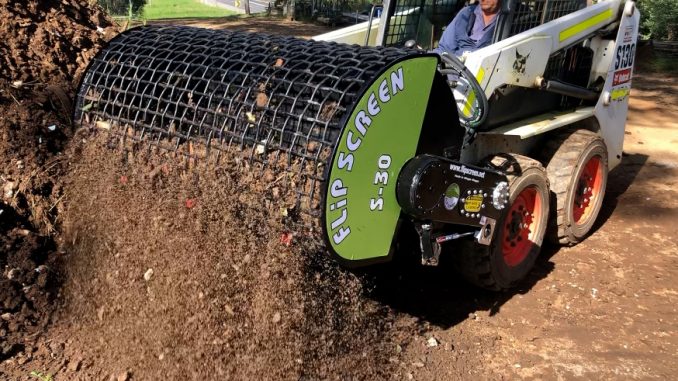
View the complete article here.
If you can scoop it, you can Flipscreen it… or so the saying goes. Well, it’s true. Dig into its utilization, and you will see that a Flipscreen is widely used in multiple industries, from scrap in Brazil, to waste in India, landscaping in Canada to topsoil in Australia, and everything in between.
From big to small jobs, its time and space-saving, strength in logistics and mobility, and grade adaptation make it an indispensable tool. The real opportunities for contractors come in its ability to process materials on-site and to be able to reuse that cleaned soil, making it much cheaper to take the leftover waste material to the dump. To paint a picture, lets present this as a “day in the life”, scenario.
Suppose you do property or landscape work, and you receive a call for a job, located 20 miles from where you are, for a site cluttered with various materials. There is also not a lot of space for maneuverability, so you need to be conscious of how much space you are taking up. The owner doesn’t care what you do with the material, he just wants the site free of it. You get the job and after your morning coffee, you jump into your truck. A 12,000 lb excavator on the trailer behind you, and attached to that, your E30 Flipscreen excavator screening bucket. It has a volume of 0.9 m³ and is capable of screening around 54 yds³ per hour.
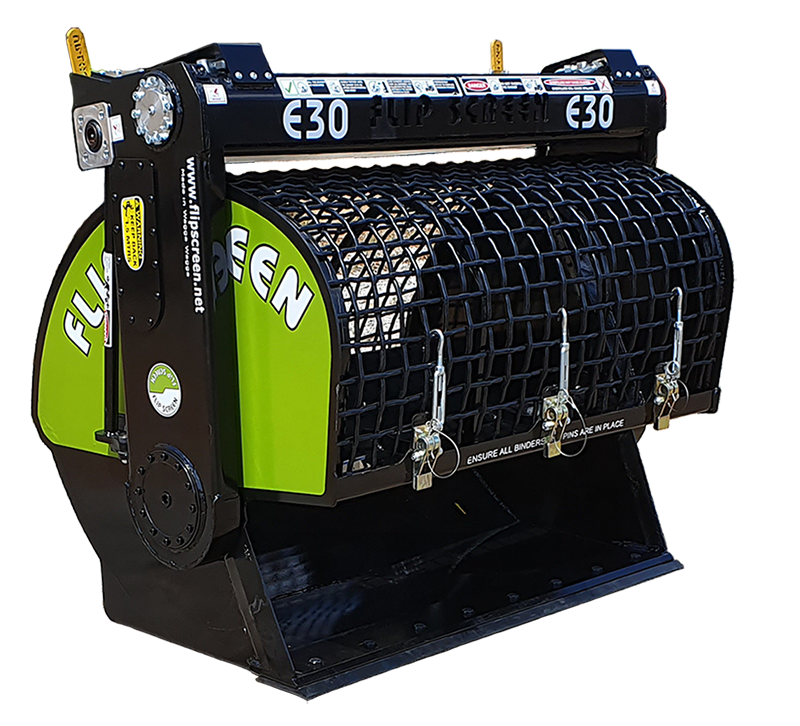
After just over half an hour’s drive, you pull up to the site, you park your truck, and not much later, you are facing your first pile of material in your excavator. No site set up time required.
You have a mound of dirt in front of you, intermingled with all types of scrap metal, from engine bits to tapware, and who knows what else. What you do know is that it’s worth money and your Flipscreen will make easy work of it. 3 hours later and you have gone through 162 yds³. You clean up the dirt piles of scrap metal, producing clean dirt which is screened and now can be sold as clean fill, but you also dig into the fresh ground and find the extra scrap metal which is hiding in the dirt beneath the pile. You know that this reclaimed scrap contains hundreds, maybe thousands of dollars’ worth of ferrous and non-ferrous metals. This is turning into a very profitable day’s work. The site owner is also happy that you have gotten rid of this hazardous looking material.
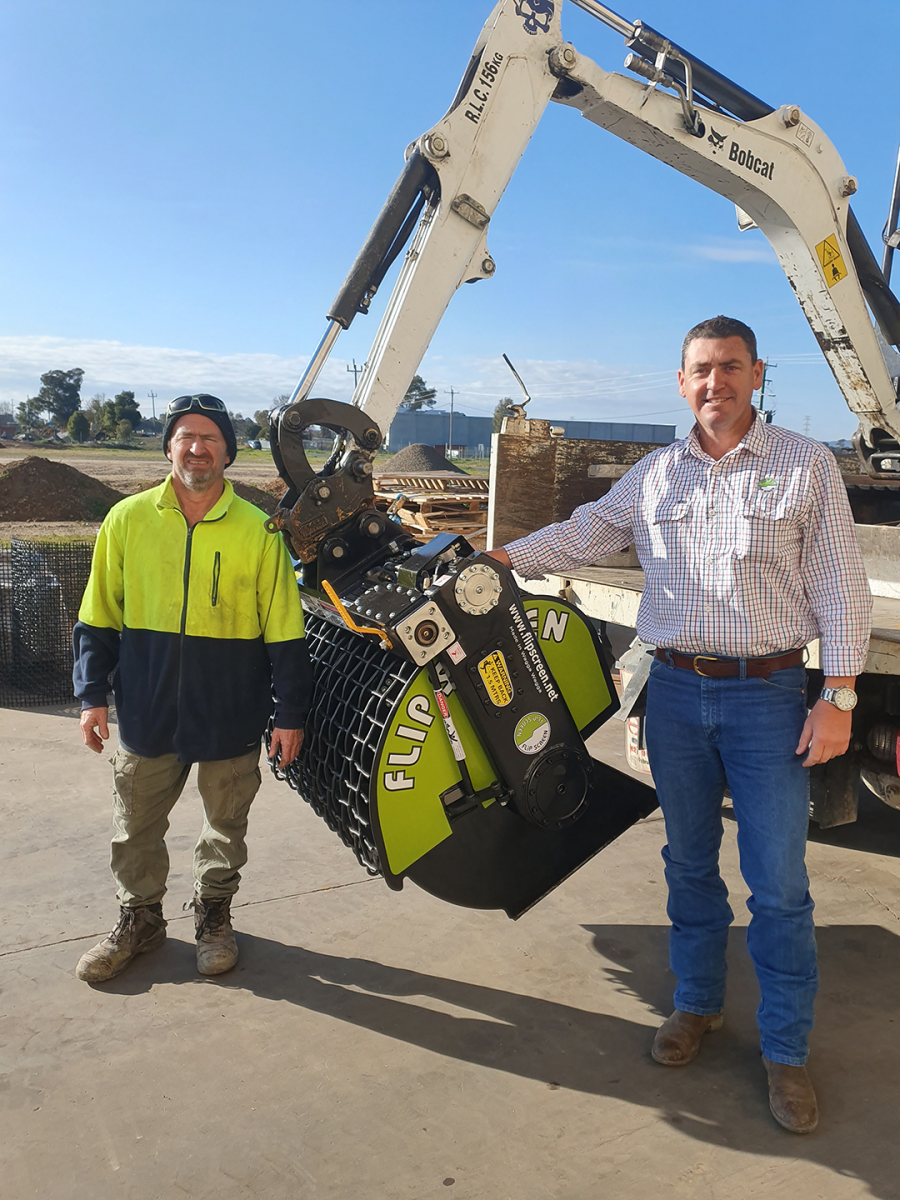
Next up is a mound of weed-infested dirt, with bits of stick, and some stones, and other vegetation in it. It’s also wet and a little sticky. Luckily your Flipscreen is fitted with a brush kit, and so you easily separate the grass, vegetation, and rocks into valuable topsoil without the sticky material clogging up your screen, as the brush clears it on every rotation.
You hardly slow down, driving into the next pile, encountering different sized rocks and more sand. You have a 1-inch screen on, and in no time at all, have a large pile of topsoil and a large pile of different sized rocks. You decide to throw on your 3-inch screen. You left your tools at home, but it still takes you only 5 minutes, and you can then screen those larger rocks again, getting out some 3-inch minus, 1 inch plus gravel.
You decide to return the next day to complete the site, leaving your excavator there. You have screened 336 m³ of material, in the 8 hours you have been on-site today and made some good cash from metals and topsoil, but you also have some gravel for another site, where a client wants to pave a driveway.
The next day you find that the other half of your client’s site has been used as a dumpsite, with almost little to no space to get around. You smile. Flipscreen screening buckets can be found as a key player in applications such as waste transfer stations or dumpsites. The Flipscreen will remove clean soils from the rubble, allowing for the sale of the soil and the reuse of crushable concrete and rock. Flipscreen screening buckets are also found removing the soil content at dumpsites saving the valuable air space of the landfill. The great space savings allow small to medium waste companies to sort their skip bin loads to be sent to cheaper dumps all within an extremely small work area. This allows these operators to save many thousands of dollars per day and helps them compete against mega waste companies.
While going through the dump, you also find there is a considerable amount of concrete.
In many situations, the cost difference between concrete and dirt mixed, or concrete and dirt separated can be the difference between profit and loss on a job.
Once the concrete is separated from the dirt and other small contaminants it becomes cheap to get rid of. Equally, once concrete boulders are removed from dirt, that dirt can become clean fill which can be sold or given away, dramatically reducing costs on a construction or demolition site. The Flipscreen screening bucket can separate these components in seconds.
You finish up with even more topsoil to sell and recyclable concrete. You have cleared the site and much more importantly, your profits have not been severely depleted by tipping/dumping fees which have been cut from 10k to about $800.
You have saved on hassle as well, only having to handle the material one time, screening wherever you needed, and not needing to drive back and forth. You didn’t need to pay another operator to help run your old grizzly or trommel screen, keeping it clear of rocks, etc. The maintenance cost over the 2 days, is just a couple of squirts of grease.
And the cost to get your screener to the site was no more than the cost of driving to the site. Simple, small contracting jobs have become a much more profitable venture, due to the benefits the Flipscreen provides. And no surprise using the world’s best screening bucket.
View the complete article here.
How does a Flipscreen contribute to cost savings and increased efficiency in construction and landscaping projects?
Flipscreen screening buckets efficiently process various materials on-site, allowing contractors to reuse cleaned soil, sell recyclables like metals and topsoil, and reduce disposal costs, ultimately enhancing profitability.
What applications and industries benefit from using Flipscreen screening buckets?
Flipscreen screening buckets find versatile applications across industries, from handling scrap in Brazil, waste in India, and landscaping in Canada to processing topsoil in Australia, making them a valuable tool in multiple sectors for efficient material screening and processing.




































